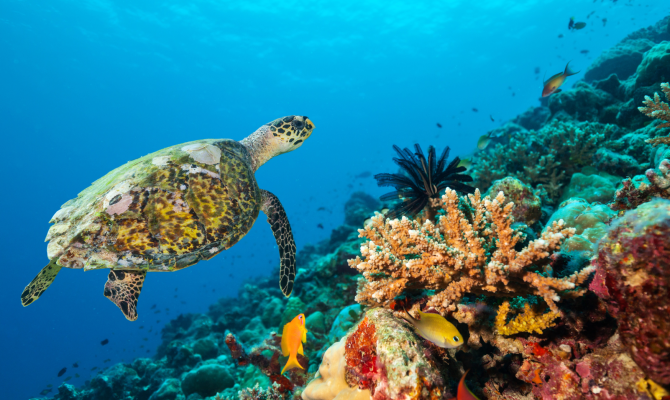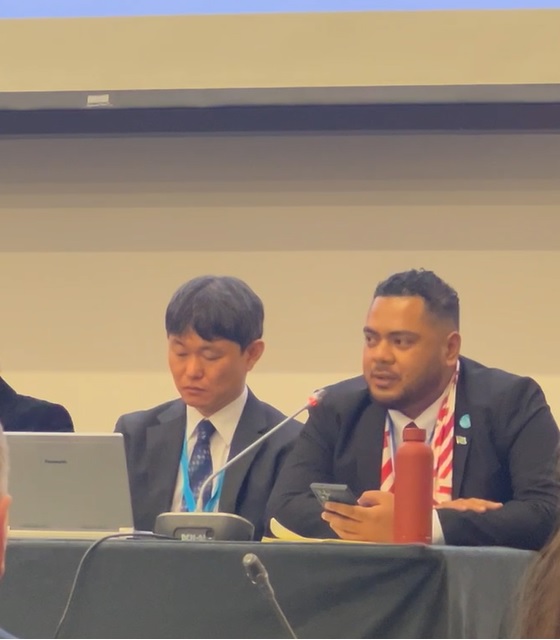
24 April 2024, Ottawa Canada – In the village of Nacamaki on the Island of Koro in Fiji, villagers would at certain times of the year take part in a sacred ancient ceremony where they would make their way to the beach, chant songs, sound the horn of the conch shells in specific rhythms, to call turtles to shore.
The turtles are sacred, and the villagers are forbidden to hurt or harm the turtles. As their protector and deity, it is believed that the turtles bring blessings with them and will always answer their call. This ceremonial practice is still observed to this day, but we know that plastic pollution can disrupt the natural movement patterns of turtles.
This story was shared at a thematic side event, titled, ‘Plastic pollution in the marine environment’ at the margins of the fourth session of the Intergovernmental Negotiating Committee (INC-4) to develop an international legally binding instrument on plastic pollution, including in the marine environment, in Ottawa, Canada today.
The storyteller was Rufino Varea, an indigenous Rotuman scientist from Fiji researching marine ecotoxicology.
“We need to think about this issue of plastic pollution from an equity lens, particularly as it relates to Indigenous communities. Pacific Islanders are ocean people, and the ocean is the source of our origin stories and what connects us as Pacific people. Without the ocean, we lose our sense of belonging and roots,” Mr Varea said.
“Plastics are mostly found in the marine environment but it doesn’t start there. Most of the plastics we deal with in PSIDS are from external sources,” he added.

About eight million tons of plastics end up in the world’s oceans every year and about 80 per cent of this comes from land-based sources. It is estimated that one-third of all fish we eat and 90 per cent of all sea birds have ingested plastic. If we continue to pollute at the same rate, there will be more plastic than fish in the ocean by 2050.
“We are on the downstream end of the problem. If you want to protect the marine environment and indigenous communities, the focus should move to the source of the problem, the upstream end where the extraction and production happens,” Mr Varea added.
“Plastic waste has become so difficult to manage that some indigenous and local people have been found to use it as sources of cooking fuel because we have entire mangrove forests, which are primary sources of firewood, overrun and replaced by plastic pollution.”
Mr Varea told the delegates at the side event that in his research he had found that the issue wasn’t about awareness but equity. “This is an equity issue, where communities are so overburdened with plastics that there is no place to take them for safe disposal. Plastic management is extremely expensive and so is the cost to access such landfill privately to dump waste,” he said.
His sentiment was shared by Mr Mohammad Chowdhury, from the Bangladesh Ministry of Environment, Forest and Climate who was also part of the panel.
“Downstream countries are victims of cumulative plastic load through international waterways and face many adverse impacts on aquatic ecosystem, causing flood and so on. National governments of downstream developing countries also disburse extra national budgetary allocations to manage cross-border plastic waste.” Mr Chowdhury said.
“These countries have many constraints regarding their capacities and capabilities to environmentally sound management of waste resulting cross borders plastic waste. Considering all the circumstances, special attention needs to be given to the downstream developing countries to manage cross-border plastic pollution to stop negatively impacting their environment, social and economic dimension of sustainable development,” Mr Chowdhury added.
Mr Varea said he hopes that the plastics treaty when finalised will be a robust and comprehensive instrument that addresses plastic pollution throughout its entire lifecycle.
“It is our hope that what we do here today, can help indigenous communities, like the people of Nacamaki, continue to observe these sacred ceremonial practices,” he said.
The fourth Intergovernmental Negotiating Committee to develop an international legally binding instrument on plastic pollution, including in the marine environment is taking place in Ottawa, Canada, from 23-29 April 2024.
The Pacific Islands are represented by the Cook Islands, Federated States of Micronesia, Fiji, Kiribati, Marshall Islands, Nauru, Niue, Palau, Papua New Guinea, Samoa, Solomon Islands, Tonga, Tuvalu and Vanuatu through the support of the Government of Australia and the United Nations.
They are supported by the Secretariat of the Pacific Regional Environment Programme (SPREP), working with partners the Pacific Islands Forum Secretariat (PIFS), Office of the Pacific Ocean Commissioner (OPOC), The Pacific Community (SPC), Forum Fisheries Agency (FFA), Environmental Investigation Agency (EIA), Centre for International Environmental Law (CIEL), University of Wollongong, WWF and Massey University.
For more information visit: https://www.unep.org/inc-plastic-pollution/session-4